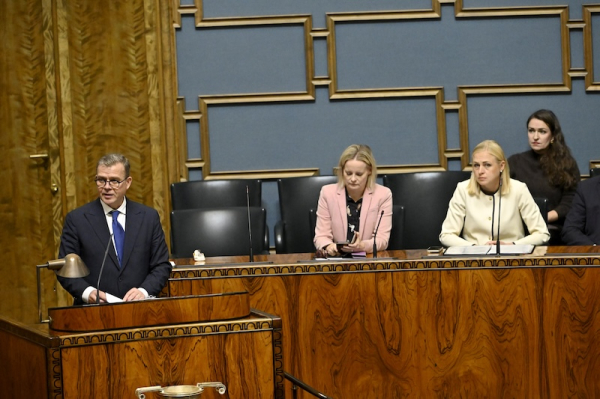Orpo sets conditions for recognising Palestine amid heated debate in parliament

In the government benches, Minister of Finance Riikka Purra, Minister for Foreign Affairs Elina Valtonen, and Minister of Local and Regional Government Anna-Kaisa Ikonen (right) follow Prime Minister Petteri Orpo’s speech during the plenary session of Parliament in Helsinki on 30 September 2025. The session includes an interpellation debate on the government’s capacity to act regarding the recognition of the State of Palestine. Photo: Roni Rekomaa / Lehtikuva
- Next Article Government alcohol bill moves forward despite Christian Democrat dissent
Petteri Orpo told parliament that Finland will recognise Palestine only after specific conditions are fulfilled, including the removal of Hamas from governance and the release of Israeli hostages. His remarks followed a no-confidence motion from opposition parties accusing the government of foreign policy paralysis.
The debate was triggered by an interpellation submitted by the Social Democrats, Greens, and Left Alliance. The motion questioned why Finland did not join several countries at the UN General Assembly the previous week in announcing formal recognition of Palestine.
“Our position has not changed. We support a two-state solution. But recognising Palestine will only proceed once there are clear commitments to peace and security,” Orpo said in his address.
He referenced Denmark’s recent announcement, which tied Palestinian recognition to strict conditions. “Finland shares Denmark’s position,” he added.
Those conditions include the release of hostages held by Hamas, the exclusion of any terrorist-listed organisations from the future Palestinian administration, and clear progress in disarmament and governance reforms by the Palestinian Authority.
“Hamas or any other group aiming to destroy Israel cannot play a role in Palestine’s future,” Orpo stated. “Without these commitments, the Finnish government will not advance recognition.”
The Prime Minister also criticised Israel’s military actions, calling them disproportionate and in violation of international law. He reaffirmed Finland’s condemnation of Israeli settlements in the West Bank and support for EU sanctions related to those settlements.
Opposition MPs argued that now is the right time to recognise Palestine, viewing the move as part of a broader peace process. Johannes Koskinen of the Social Democratic Party said that recognition should not be seen as a final step but as a political act supporting moderate forces within Palestinian society.
“This is about the Palestinian Authority in the West Bank, not Hamas,” Koskinen said. “We are not recognising Hamas or any terrorist group.”
Nasima Razmyar, also from the SDP, questioned the government’s divergence from the position of President Alexander Stubb, who has stated he is ready to recognise Palestine if the government proposes it. She described Finland’s absence from the recent international recognitions as “a strange and isolated stance.”
Sofia Virta of the Greens said the two-state solution is eroding daily and warned that the opportunity for recognition could close soon. She accused the Israeli government of conducting war at the expense of Palestinian existence and pointed to the ongoing occupation of the West Bank since 1967.
Mai Kivelä of the Left Alliance called Finland’s policy “spineless inactivity” and said that recognising Palestine should have been the minimum response.
The Centre Party did not join the interpellation but voiced criticism during the session. Party leader Antti Kaikkonen expressed distrust in the government’s foreign policy management and urged a unified approach between the government and the president.
“It’s not wise for Finland to be the last to act in world politics,” Kaikkonen said.
Otto Andersson, chair of the Swedish People’s Party parliamentary group, said his party supports recognising Palestine now. “Recognition is not symbolic; it is a necessary step,” he told parliament. Despite this, the party declined to back the no-confidence motion.
Andersson warned that a government collapse would lead to an extended caretaker period, delaying any policy decisions, including on Palestine. In response, Virta questioned whether there was any difference, saying the government is already politically paralysed.
The US peace plan, announced earlier this week by President Donald Trump after meeting Israeli Prime Minister Benjamin Netanyahu, also influenced the debate. The plan calls for a ceasefire and the release of hostages.
Razmyar welcomed the initiative but warned that lasting peace requires bringing Palestinians to the negotiation table. Former foreign minister Pekka Haavisto said the plan had backing from several Arab countries and represented a rare opportunity.
Atte Kaleva of the National Coalition Party called the plan historic.
Throughout the session, Orpo reiterated that the government would proceed with recognition only if the specified conditions are met. “We have now defined our stance clearly. It aligns closely with Denmark’s,” he said.
The parliamentary debate continued late into the evening. A vote on the interpellation and any motion of no confidence is expected to follow.
HT
- Next Article Government alcohol bill moves forward despite Christian Democrat dissent
Source: www.helsinkitimes.fi
